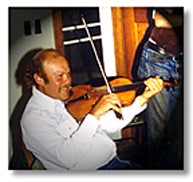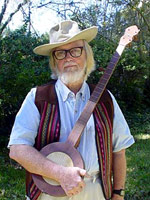2004 Guests of Honor |
||
 Mike Williams |
||
Mike Williams
Mike Williams’ earliest exposure to live music was strolling string
musicians on the beach in St. Petersburg, Florida where he grew up. The other
early influence was the record collection of his mother’s sister in
Albany, Georgia. He played drums in several groups while in high school and
during service in the Navy. He began to play the mandolin in 1964 during
the “ Folk Revival “. He ultimately became proficient on guitar,
five-string banjo, and fiddle, all of which he presently teaches.
During his college years he played with various bluegrass and old-time bands
in Georgia and North Carolina. After moving to Colorado in 1972, he was a co-founder
of the Colorado Bluegrass Music Society. He was instrumental in organizing the
Rocky Mountain Bluegrass Festival, as well as serving as editor and contributor
to the organization’s newsletter.
Mike moved to Helena, Montana in 1975, where he has continued to teach
music and organize concerts and fiddle contests. He was a co-founder of
the Helena Folklore Society (1984-87). He is a charter member of the Greater
Helena Parlour Picking Society, which is still active after 28 years.
Mike has produced several recordings by the Helena Parlour Pickers and
the Montana State Old Time Fiddlers Association. He was instrumental in
organizing the first MSOTFA fiddle camp, which he remains active with,
serving as a director and teacher.
In the year 2000, Mike received a grant from the Montana Arts Council for an
apprenticeship in old-time dance fiddling. He was a Guest of Honor, with Terry
Williams, at the 1989 Florida Old Time Music Championship and will be returning,
along with Gainesville’s Cherrill Heaton, in 2004.
Mike presently teaches music and repairs stringed instruments, and plays country
dances with the Parlour Pickers and the Schnell Brothers.
Discography:
Yellow Cat – The Schnell Brothers
Although he is a Montana State Fiddle Champion, Mike plays guitar on this
tasty CD of old time fiddle tunes along with other brothers, Bill
Sevores: fiddle, Rick McCracken: fretted & fretless
banjo, John Joyner: guitar and banjo-uke.
Cherrill Heaton was born in Jacksonville, Florida. His grandfather
Robert T. “Uncle Bob” Smith, who homesteaded on the Indian
River in the 1880’s and supplied oranges to Franklin D. Roosevelt’s
White House, was an accomplished a fiddle and banjo player. Uncle Bob’s
banjo and fiddle survive him at the old home place, which is now well
known as Honest John’s Fish Camp, a few miles north of the Sebastian
Inlet on A1A.
Cherrill’s father played the guitar, his mother played the mandolin, and
everybody in the family sang. “There was always music in the house. I
learned to sing harmony by singing with my sister in the bathtub when we were
small children.” Through grammar and high schools, Cherrill played violin,
French horn, Dixieland trumpet, and boogie-woogie piano.
At Princeton University he listened to the string band 45s and 78s of a roommate.
After graduation in 1954, he moved to Miami and soon bought a 5-string open-back
Kay in a pawnshop. For the next five years, he tried to teach himself the banjo.
In 1960, as a graduate student in English at Florida State, a fellow student
overheard him doing his rudimentary picking one night and said, “I know
somebody you need to meet.” They went to a little house near the Westcott
Gate, and Cherrill was introduced to Florida’s legendary banjoist Paul
Champion, who was a student in the FSU business department. Cherrill says, “I
hadn’t met a banjo player in five years, and then I met one of the best.
In 5 minutes Paul straightened me out on the basics of the banjo.” At
the time, Paul and Jim Rogers (later to be known as Gamble) were playing at
a small club, the Baffled Knight, when Cherrill met Gamble Rogers. Gamble would
announce the song name, they would play it, and Gamble would announce another
song. Gamble had not yet developed his legendary stage presence.
In 1961, Cherrill was in graduate school at the University of North Carolina
at Chapel Hill when he came upon some people singing “Michael Row the
Boat Ashore,” led by a big fellow with a strong voice and a long-necked
Pete Seeger Vega banjo. And so Cherrill met Ed Flemming, who was in Chapel
Hill getting his Master’s in Public Health. Along with Joan Moser (later
to author Instrumental Folk Music of the Southern Appalachians: Traditional
Fiddle Tunes), they formed a string band, the Chicken Farmers, and performed
around the town and on campus. Their big moment was opening for the New Lost
City Ramblers and getting to go to dinner with them. Cherrill and Ed both returned
to Florida in 1962 and picked together in Tallahassee, Jacksonville, and elsewhere.
Back at FSU, Cherrill soon met Will McLean, who was living in Tallahassee with
his wife Alice. Will’s songs had never been written down, so Cherrill
and Will began the project. Will would sing them and Cherrill would transcribe
them as a single line of music. Burk Sauls, publisher of a small Tallahassee
magazine called The Roundtowner, wanted to help Will, so Burk and Cherrill
worked together to print the first version of Florida Sand, containing
words and music to about 10 or 12 of Will’s songs, along with some explanation
of each. Will and Cherrill performed together on numerous occasions over the
next several years.
In 1962 and 1963 Cherrill showed Mike Williams the basics of the mandolin and,
as Cherrill puts it, “a promising philosophy major was thenceforth lost
to music.” During the 1960s Cherrill played guitar and banjo at the Florida
Folk Festival, one configuration of musicians being Mike Williams on mandolin,
Dr. John Green of the FSU faculty on banjo, Jon Rogers on washtub bass, and
Cherrill on guitar. Mike and Cherrill also played in a Hank Williams-oriented
country band around Tallahassee: Old Red and His Capital City Boys. During
this period Cherrill, his wife Marieta, her sister Barbara Barrow, and Flip
Pearce had a band called The Pearce Family Singers, which performed around
the state in shows put together by Ed Flemming. Barbara is married to Michael
Smith, composer of “The Dutchman,” “Gamble’s Guitar,” and
many other fine songs.
Cherrill was in North Carolina from 1966 to 1974. Will McLean stopped in to
see him on his way to perform at Carnegie Hall with Pete Seeger. Cherrill returned
to Florida in the mid-1970s to join the English faculty at the University of
North Florida in Jacksonville. He was able to bring Ralph Stanley and the Clinch
Mountain boys, the Osborne Brothers, and Don Reno and the Tennessee Cut-Ups,
in addition to Gamble, Paul Champion, Doc Watson, and John Hartford to perform
on campus.
In 1984, Cherrill successfully encouraged the governor of North Carolina to
declare January 6 to be Earl Scruggs Day in North Carolina, honoring Earl's
60th birthday, and he presented the commemorative plaque to Earl on the governor’s
behalf,
Cherrill is the author of instrument instruction manuals and numerous articles
on folk music, most notably, “The Five String Banjo in North Carolina” for Southern
Folklore Quarterly, reprinted in Banjo Newsletter. He wrote the
first review of Paul Champion’s banjo book, for Sing Out.
In addition to his 1941 Martin D-18, Cherrill picks a mountain banjo made by
North Carolina craftsman Clifford Glenn and an original 1960s Ode banjo. In
recent years his public appearances have been limited to occasional performances
with The Florida Blue Grass Boys, helping to carry on the band Paul Champion
formed many years ago.
